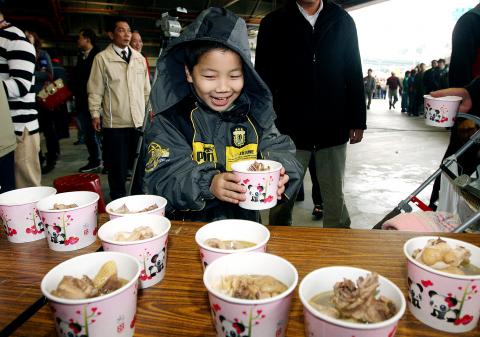The Taipei City Government yesterday gave away more than 3,000 bowls of sesame oil chicken soup at the Taipei Livestock Wholesale Market to boost consumers’ confidence in domestic chicken products, following a recent outbreak of H5N2 avian flu.
Chefs invited by the Taipei Livestock Products Marketing Corp loaded chunks of chicken into a soup seasoned with sesame oil and invited residents to enjoy a free bowl for lunch.
Deputy Taipei Mayor Chen Hsiung-wen (陳雄文) oversaw the public feast. He said the city -government had introduced a series of anti-avian flu quarantine measures to keep the H5N2 virus at bay.

Photo: CNA
All chickens and other poultry are to be inspected on being sent to the wholesale market, and certification stickers will allow consumers to know they are purchasing products that have passed health and safety tests.
Taipei’s Market Management Bureau Director Ding Juo-ting (丁若亭) said the municipal livestock market handles between 60,000 and 80,000 chickens each day, while more than 5,800 registered birds come from private chicken or livestock farms.
Wholesale trade in chicken products has fallen 30 percent since the bird flu outbreak began, he said.
“The city government is tightening quarantine measures to ensure the safety of chicken products, and consumers should not be too worried about the avian flu as long as they purchase products with certification stickers,” he said.
Since the outbreak was confirmed earlier this month, more than 50,000 chickens have been culled in areas around Greater Tainan and Changhua County, the Council of Agriculture has said.
While the Center for Disease Control emphasized that the H5N2 strain cannot be passed from animals to humans, local governments have been enhancing quarantine measures to ease public concerns about food safety.
Ding said the city government would increase the number of blood samples taken from birds from 300 to 600 a month.
The more rigorous inspections should enhance food safety, Ding said.

A relatively large earthquake may strike within the next two weeks, following a magnitude 5.2 temblor that shook Taitung County this morning, the Central Weather Administration (CWA) said. An earthquake struck at 8:18am today 10.2km west of Taitung County Hall in Taitung City at a relatively shallow depth of 6.5km, CWA data showed. The largest intensity of 4 was felt in Taitung and Pingtung counties, which received an alert notice, while areas north of Taichung did not feel any shaking, the CWA said. The earthquake was the result of the collision between the Philippine Plate and the Eurasian Plate, the agency said, adding

Snow fell in the mountainous areas of northern, central and eastern Taiwan in the early hours of yesterday, as cold air currents moved south. In the northern municipality of Taoyuan, snow started falling at about 6am in Fusing District (復興), district head Su Tso-hsi (蘇佐璽) said. By 10am, Lalashan National Forest Recreation Area, as well as Hualing (華陵), Sanguang (三光) and Gaoyi (高義) boroughs had seen snowfall, Su said. In central Taiwan, Shei-Pa National Park in Miaoli County and Hehuanshan National Forest Recreation Area in Nantou County saw snowfall of 5cm and 6cm respectively, by 10am, staff at the parks said. It began snowing

The 2025 Kaohsiung Wonderland–Winter Amusement Park event has teamed up with the Japanese manga series Chiikawa this year for its opening at Love River Bay yesterday, attracting more than 10,000 visitors, the city government said. Following the success of the “2024 Kaohsiung Wonderland” collaboration with a giant inflatable yellow duck installation designed by Dutch artist Florentijn Hofman, this year the Kaohsiung Tourism Bureau collaborated with Chiikawa by Japanese illustrator Nagano to present two giant inflatable characters. Two inflatable floats — the main character, Chiikwa, a white bear-like creature with round ears, and Hachiware, a white cat with a blue-tipped tail

HOLIDAY EXERCISE: National forest recreation areas from north to south offer travelers a wide choice of sights to connect with nature and enjoy its benefits Hiking is a good way to improve one’s health, the Forestry and Nature Conservation Agency said, as it released a list of national forest recreation areas that travelers can visit during the Lunar New Year holiday. Taking a green shower of phytoncides in the woods could boost one’s immunity system and metabolism, agency Director-General Lin Hwa-ching (林華慶) cited a Japanese study as saying. For people visiting northern Taiwan, Lin recommended the Dongyanshan National Forest Recreation Area in Taoyuan’s Fusing District (復興). Once an important plantation in the north, Dongyanshan (東眼山) has a number of historic monuments, he said. The area is broadly covered by